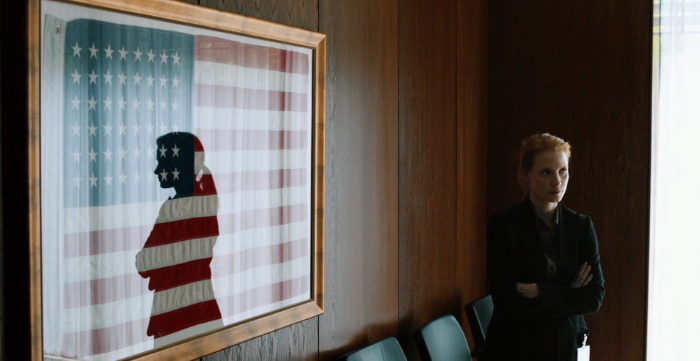If you were watching the Emmys two Sundays ago, you’d be forgiven for thinking you had mistakenly clicked to CNN or MSNBC. It seemed like half the winners were shows about politics. Veep took home a couple of acting awards, Jeff Daniels was a surprise winner for The Newsroom, and Claire Danes took home her second Emmy in a row for her lead role on Homeland. Also, Ellen Burysten won for a guest spot on Political Animals, and House of Cards, Scandal, and The Good Wife each took home an award or two. Shockingly, 1600 Penn was not nominated.
I wouldn’t be surprised if we are reaching a saturation point for political entertainment, and I’m pretty sure the blame lies with President Obama. There has always been a market for movies and television shows with political themes, but when Obama came around and engaged an entire generation of young people in the political process in 2008, network and movie studio executives took note. Their target demographic was interested in politics all of a sudden, and they quickly adjusted.
At least, the TV executives did. The movie studios have been a little more timid. It’s understandable; they can’t appeal to niche audiences in the same way as television. The foreign market is an increasingly important part of their profit margins, and American politics just doesn’t translate well overseas. Look at how poorly political movies have fared in the Obama era. State of Play? $37 million in domestic gross. Green Zone? $35 million. The Ides of March, with the two hottest actors on the planet, Clooney and Gosling? $40 million.
Last year was an exception. Argo, Lincoln, and Zero Dark Thirty were each nominated for multiple Oscars and grossed $400 million between them. But 2012 was also an election year, and America’s interest in politics was piqued. While Lincoln would have been a hit in any year, the grosses of ZDT and Argo were almost certainly inflated by their connections to current events and an American electorate that was mentally taking stock of its nation and leader for most of the year.
So, overtly political movies remain the exception. Instead, Hollywood’s modus operandi has been to offer more subtle political commentary in mainstream popcorn movies that reflect the politics of the moment, even though they may not be set in the world of politics or have a partisan slant. For example, class warfare has been a predominant theme in the films of the Obama era – from The Hunger Games and The Dark Knight Rises to Anna Karenina and Moneyball – and it’s easy to view these films as expressions of our complicated feelings about the 2008 financial crisis. Critics from both the left and right have tried to claim some of these films as their own, but none are actually polemics. They simply reflect the issues that our society is collectively working through, and so the movies, which must appeal to the widest possible audience, are the most illuminating medium for assessing our national politics.
This fall offers numerous examples of Hollywood’s persistent use of subtext to engage a more politically aware generation of moviegoers. Financial corruption and income inequality continue to grace the screen with The Hunger Games: Catching Fire, Runner Runner, and The Wolf of Wall Street. Further, you can learn a lot about a film’s values by who its villain is, so it should be noted that the reboot of Jack Ryan offers a bad guy who is a financial terrorist.
For years, race was a subject that many filmmakers shied away from, but since Obama’s election, the studios have been wading further into these waters. The Help and The Blind Side offered tame white savior stories, but their success may have paved the way for the more progressive films of the last year: Django Unchained, Fruitvale Station, and The Butler. Now, we have 12 Years A Slave, which appears to be the most progressive of all. It also might be the most successful. After premiering at the Toronto International Film Festival earler this month, it’s viewed by many as the front-runner for Best Picture.
There are a few overtly political films slated for release this fall, but none of them are expected to do much business. Naomi Watt’s Diana premiered to awful reviews in England and is scheduled for a limited release here in the U.S. The Fifth Estate could do a tidy business on the coasts, but the biopic of Wikileaks founder Julian Assange has limited appeal.
Parkland, which tracks the several days after the JFK assassination through the eyes of characters tangentially connected to the event, might do better, but it notably eschews actual politics. Instead of focusing on political intrigue or conspiracy theories, first-time director Peter Landesman keeps his gaze squarely on the human side of the story, following the lives of several characters tangential to the assassination, including Abraham Zapruder (Paul Giamatti), who shot the famous footage of the assassination, and Robert Oswald (James Badge Dale), brother of the assassin.
The real test of America’s appetite for political films, however, will be David O. Russell’s American Hustle. Based on the true story of the ABSCAM scandal, in which seven members of Congress were arrested for bribery and conspiracy in the late ‘70s and early ‘80s, the film mashes together the casts of Russell’s last two films, The Fighter and Silver Linings Playbook, both of which were critical and commercial successes. Christian Bale, Bradley Cooper, Jennifer Lawrence, Amy Adams, and Robert DeNiro are all on hand. But the trailer notably downplays any political element to the film, instead framing it as a ‘70s fashion piece, more Boogie Nights than Bulworth. It’s clear that Hollywood just doesn’t think moviegoers care about politics, unless, of course, it’s an election year.

















